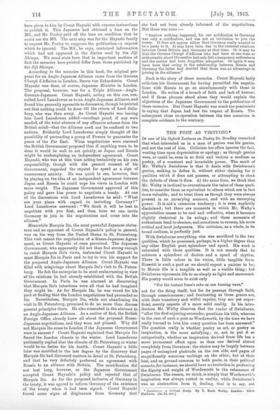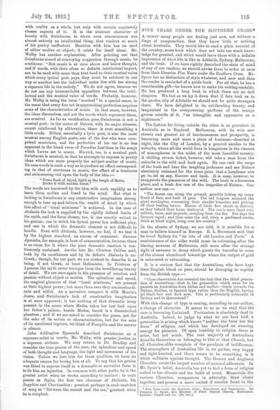THE POET AS VIRTUOSO.°
Ix one of his Oxford Lecturea on Poetry Dr. Bradley remarked that what interested us in a man of genius was his genius, and not the rest of him. Criticism too often ignores the fact, wasting time upon depreciation or apology ; as though genius were, or could be, even in so fluid and various a medium as poetry, of a constant and invariable power. The merit of Mr. Welby's Swinburne is that it deals with Swinburne's genius, seeking to define it, without either claiming for it qualities which it does not possess, or attempting to cloak the defects of those it does, At the same time, we think that Mr. Welby is inclined to overestimate the value of these quali- ties, to consider them as equivalent to others which are in fact more valuable; and to treat them as though they were always present in an unvarying measure, and with an unvarying power. It is not a conscious tendency ; it is even explicitly disclaimed ; but there are moments in which Mr. Welby's appreciation ceases to be cool and reflective, when it becomes slightly rhetorical in its eulogy; and these moments of enthusiasm tend to obscure, and sometimes to reverse, his more critical and level judgments. His criticism, as a whole, in its broad outlines, is perfectly just.
With Swinburne everything else was sacrificed to the two qualities, which he possessed, perhaps, in a higher degree than any other English poet, splendour and speed. His work is saturated with these qualities. It is not merely that he achieves a splendour of diction and a speed of rhythm. There is little colour in his vision, little tangible form. Rossetti is such a poet as we should expect a painter to be; to Morris life is a tangible as well as a visible thing ; but Swinburne represents life to us simply as light and movement. His poetry would seem to exist only "For the instant foam's sake on one turning wave," not for the thing itself, but for its passage through light, through consciousness ; and fascinating as these graces are, with their transitory and wilful caprice, they are yet super- ficial, merely aspects of a more solid reality. In his intro- duction Mr. Welby observes that the reader of Swinburne, "after the first rejoicing surrender, questions hie title, whereas in the case of such a poet as Wordsworth, by the time we have really learned to love him every question has been answered." The question really is whether poetry as art, or poetry as inspiration, is the more satisfying ; or, not to put it so categorically, whether an inspiration derived from life hits a more permanent effect upon us than one derived almost completely from literature: the choice may be largely between pages of uninspired platitude on the one side, and pages of magnificently sonorous verbiage on the other; but at their best, and on ground common to both poets, in their political sonnets, for instance, we should have no hesitation in preferring the dignity and weight of Wordsworth to the vehemence of Swinburne. The reason, we think, is simply that Wordsworth's inspiration was always rooted in reality, while Swinburne's was an abstraction from it, dealing, that is to say, not
• Swinburuo: a Criiical, Study. By T. Earle Welby, London Elkin Mathews. [4s. 13d. net.] with reality as a whole, but only with certain exquisitely chosen aspects of it. It is the abstract character of beauty with Swinburne, to whom even sensuousness was almost entirely an intellectual thing, that renders so much of his poetry ineffectual. Emotion with him has no need of either motive or object ; it exists for itself alone. Mr. Welby has another explanation. After pointing out that Swinburne aimed at conveying suggestion through music, he continues : "But music is at once above and below thought, and if words, with their often so definite intellectual import, are to be used with more than that heed to their musical value which every lyrical poet pays, they must be subdued in one way or another lest the individual notes live with too strong a separate life in the melody." We do not agree, because we do not see any irreconcilable opposition between the intel- lectual and the musical value of words. Probably, however, Mr. Welby is using the term "musical" in a special sense, in the sense that every fine art in approaching perfection acquires some of the characteristics of music. In that sense, however, the ideas themselves, and not the words which represent them, are musical. As far as versification goes, Swinburne is not a musical poet: in the metre of Dolores, with its major stresses, accent reinforced by alliteration, there is even something a little crude. Milton, essentially a lyric poet, is also the most musical among English poets, one of the few who were com- petent musicians, and the perfection of his -ear is no less apparent in the blank verse of Paradise Lost than in the songs which Lewes set to music. Herrick, too, is a musical poet. Swinburne is musical, in that he attempts to express in poetry ideas which are more properly the subject matter of music. He uses words in such a way as to produce an effect correspond- ing to that of overtones in music, the effect of a luminous and shimmering veil upon the body of the idea:— " Some flash of blood, light as the laugh of flame,
Broke it with sudden beam."
The words are traversed by the idea with such rapidity as to leave them molten and fused in the mind. But what is lacking in Swinburne is any constructive imagination strong enough to bear up and inform the wealth of detail by which this effect of " tonal mistiness" is achieved. In the case of Atalanta the lack is supplied by the rigidly defined limits of the myth, and the form chosen, too, is one exactly suited to his genius; one in which his lyrical power has sufficient play, and one in which the dramatic element is not difficult to handle. Even with Atalanta, however, we feel, if we test it by the highest standard, an excess of ornament. Samson Ayoniates, for example, is bare of ornamentation, because there is no room far it where the pure dramatic emotion is con- tinuously sustained. As. the late Mr. Clairton Collins said, both by its excellences and by its defects Atalanta is un- Greek ; though, for our part, vie are content to describe it as being, if not Greek, at least Hellenistic. In Tristram of Lyonesse the myth never emerges from the bewildering beauty of detail. We are once again in the presence of emotion and passion without object or motive. The splendour and speed, the magical glamour of that "tonal mistiness," are present at their highest power; but more than ever they are insubordi- nate and wilful. As a narrative compare it with Morris's Jason, and Swinburne's lack of constructive imagination is at once apparent; it has nothing of that dramatic irony present in the scene where Medea takes her last look upon her father's palace; beside Medea, Iseult is a disembodied phantom; and if we are asked to consider the poem, not for the sake of its action or characterization, but for the sake of its emotional rapture, we think of Pompilia and the answer is silence.
John Addington Symonds described Swinburne as a supreme artist in words; Mr. Welby, with greater justice, as a supreme virtuoso. We may return to Dr. Bradley and consider the true genius of the man, the splendour and speed of both thought and language, the light and movement of his vision. Unless we love him for these qualities, we have no adequate reason for loving him at all. To say that his genius was fitted to express itself in a dramatic or narrative form is to do him an injustice. In common with other poets, he is the greater artist when he works according to instinct in such poems as Itylas, the first two choruses of Atalanta, his Sapphies and Choriambies ; greatest perhaps in such snatches of song as "Between the sunset and the sea," greatest when he is simplest.



































 Previous page
Previous page